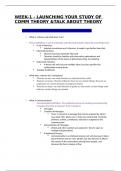WEEK-1 - LAUNCHING YOUR STUDY OF
COMM THEORY &TALK ABOUT THEORY
Chapter 1: Launching Your Study of Communication Theory
o What is a theory and what does it do?
o Theory Definition: A set of systematic and informed hunches about the way things work.
A set of Hunches:
Isolated convictions aren't theories, it needs to go further than that.
Informed Hunches:
Theories hunches should be informed
Theorists should be familiar with alternative explanations and
interpretations of the types of phenomena they are studying.
Systematic Hunches:
A theory not only lays out multiple ideas, but also specifies the
relationships among them.
Testable Predictions
o What does a theory do? (metaphors)
Theories as nets: we need theories to understand the world
Theories as lenses: theories influence how we see certain things, they put an
emphasize on certain elements (and ignore others)
Theories as maps: we need theories to guide us, they show us how things work
and how certain things are related
o What is Communication?
o Communication Definition: The relational process of creating and interpreting
messages that elicit a response. It has 5 features:
Messages
Creation of Messages:
Texts: A record of a message that can be analyzed by others
(e.g: book, film, photo, etc.). Texts are constructed, invented,
planned, crafted, constituted, selected or adopted by the
communicator.
Interpretation of Messages:
Words and other symbols are polysemic- they're open to
multiple interpretations.
A Relational Process:
Communication is a relational process not only because it takes
place between two or more people, but also because it affects
the nature of the connections among those people, and
because the flow is always at flux.
, Messages that Elicit a Response:
Effect of the message on the receptors
If a message fails to stimulate any cognitive, emotional or
behavioral reaction, it seems pointless to refer to it as
communication.
--------------------------------------------------------------------------------------------------------------------------------
---
Chapter 2: Talk About Theory:
o Two Main Perspectives:
o Objective Approach: 1 objective truth
o Definition: Assumes truth is singular and accessible through unbiased sensory
observation; seeks to uncover cause-and- effect relationships.
o Tony Schwartz's resonance principle of communication:
successful persuasive messages-> evoke past experiences-> create resonance
between the message content and a person's thoughts or feelings
Therefore -> resonance leads to persuasion through memories.
Ex: "Violent media causes violent behavior"
o Interpretive Approach: Different truths depending on the interpretation
o Definition: The linguistic work of assigning meaning to communicative texts; assumes
that there is multiple meanings or truths. Therefore, the interpretation depends on the
context
o Human Nature: Determinism or Free- Will?
o Determinism: The assumption that behavior is caused by heredity and
environment.
o Free- Will: Every human act is ultimately voluntary
o Objectivity or Emancipation?
o Objectivity: unbiased
o Empirical evidence: Data collected through direct observation
o Emancipation: Liberation from any form of political, economic, racial, religious
or sexual oppression; empowerment.
o Purpose of Theory: Universal Laws or Interpretive Guides?
, o We cannot conduct rhetorical criticism of social reality without benefit of a
guiding rhetorical theory that tells us generally what to look for in social
practice, what to make of it, and whether to consider it significant.
o Objective or Interpretive: Why is it important?
o Metatheory: Theory about theory, the stated or inherent assumptions made
wheng creating a theory.
---
o In conclusion:
o Theories are often not purely objective or interpretative
o Objective is not more "important" or more "scientific" than interpretive
o Both perspectives compliment each other
o Powerful Media
The Classic View: Powerful Media
o Context: Development of mass media
Printing press, newspapers, books (15th – 20th century)
Radio, film, television (1st of half 20th century)
Video games (2nd half of 20th century)
Computer, Internet (last part 20th century)
Mobile media (first part 21st century)
Examples of powerful reactions to media:
o Propaganda (WWII)
o
o War of the worlds (1938) -Orson Wells did an adaptation play of H.G Well's novel, "War
of the worlds" in the radio, turning the novel into fake news, describing a Martian
invasion on New Jersey, causing nationwide hysteria. This shows the passivity of the
audience and the strong effects media has on the user.
Statements:
, Powerful media reaches everyone
Passive audience
Strong effects (either positive or negative)
Uniform effects (like "magic bullet theory" or also called, "Hypodermic Needle theory",
which suggests that the media injects its messages straight into the passive audience)
Aka, media use has an effect on the user
WEEK-1 PREPARATION FOR TUTORIAL
EMPIRICAL CYCLE OUTLINE
2.1 Video: The Empirical Cycle:
o Captures the process of coming up with a hypothesis and testing it through empirical data in a
systematic way. It's a cycle because it's a continues process.
o It has 5 phases:
i. Observation (hunch):
Sparks the idea for hypothesis pattern
Can be personal, shared, imaginary…
Come from previous research
ii. Induction aka hypothesis:
generalize your observations, aka relations holds in specific cases = Relations
hold in all cases. Look for existing theory
iii. Deduction:
Hypothesis (informed hunch) is transformed with deductive reasoning and
specification of research set-up into a prediction about new observations. Then
do variables
iv. Testing:
Data collection
Compare data to prediction
Descriptive Statistics: used to summarize statistical processing
Inferential statistics to help decide if the prediction was right or not
v. Evaluation:
Interpret results in terms of hypothesis
Prediction confirmed :means the hypothesis is provisionally supported NOT
PROVEN
Prediction disconfirmed: means hypothesis automatically rejected.
Results are interpreted in terms of the hypothesis support, adjusted, or
rejected.
See why it didn't work




